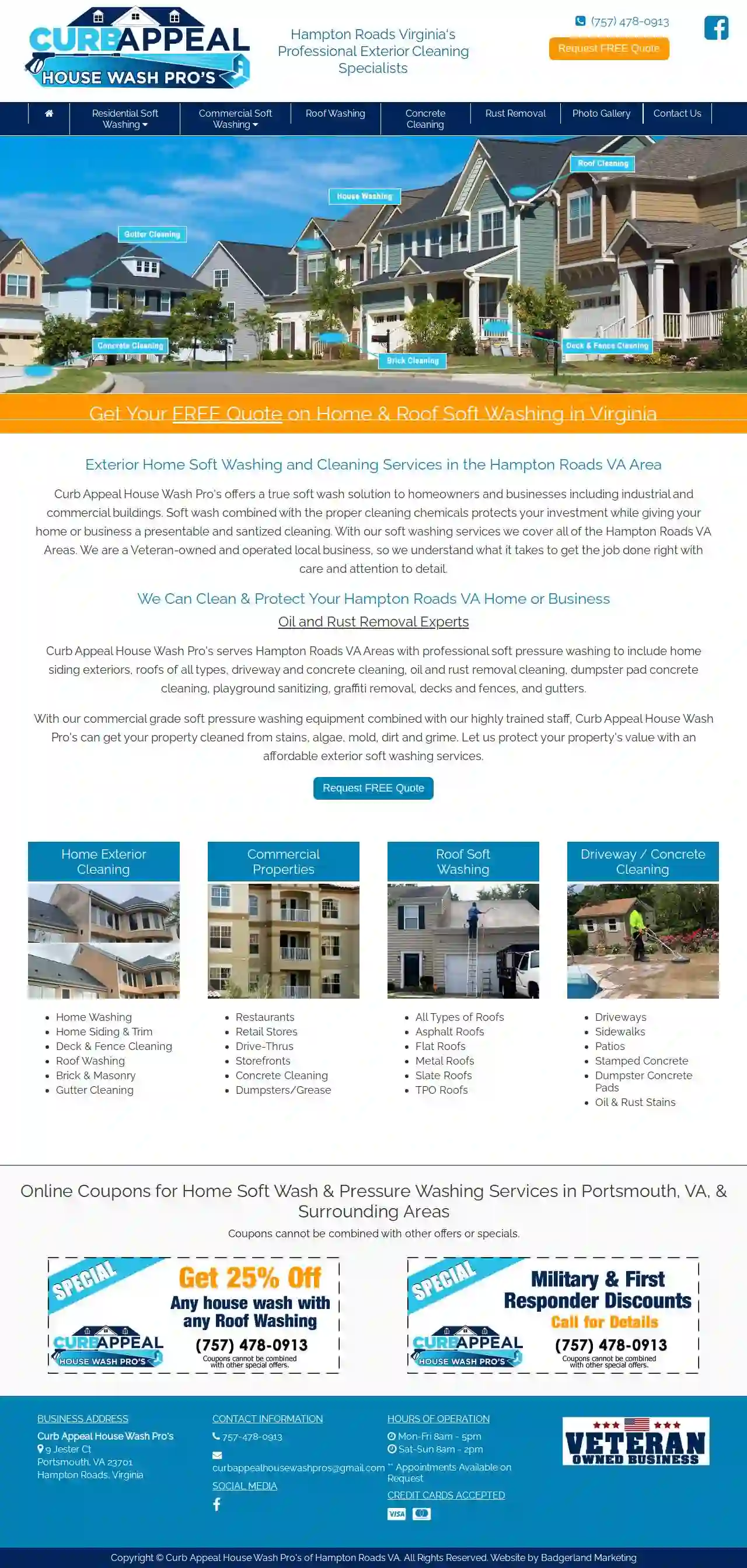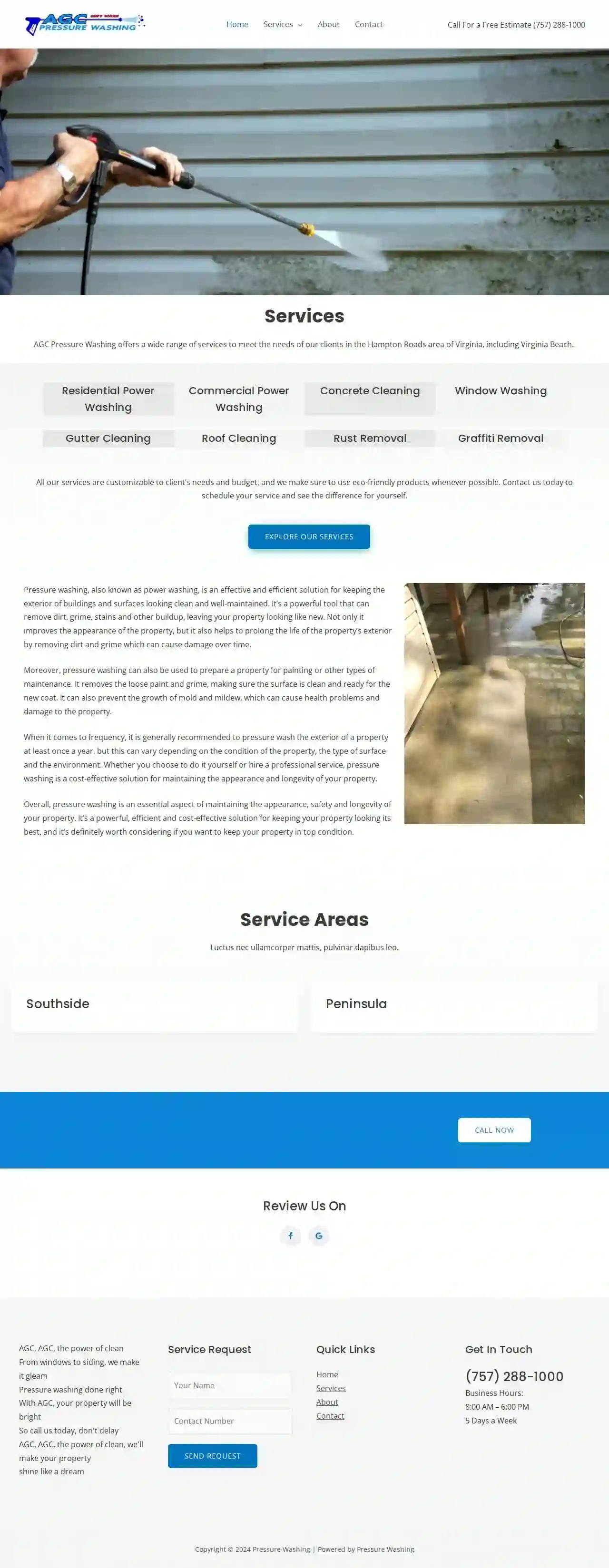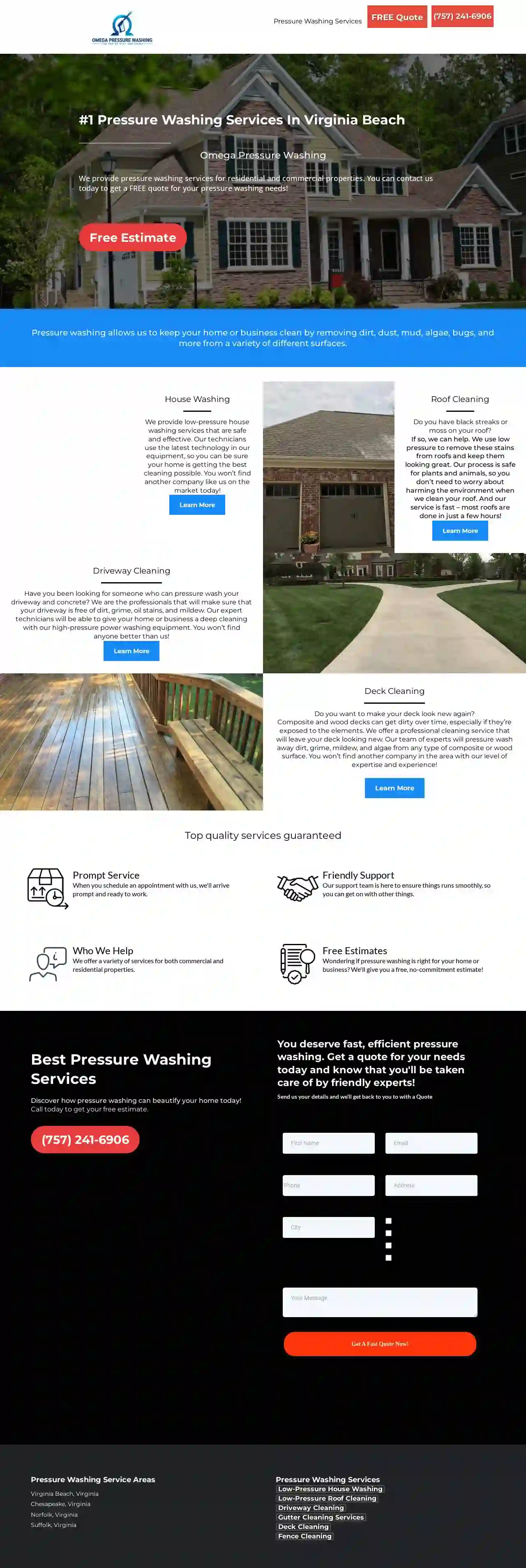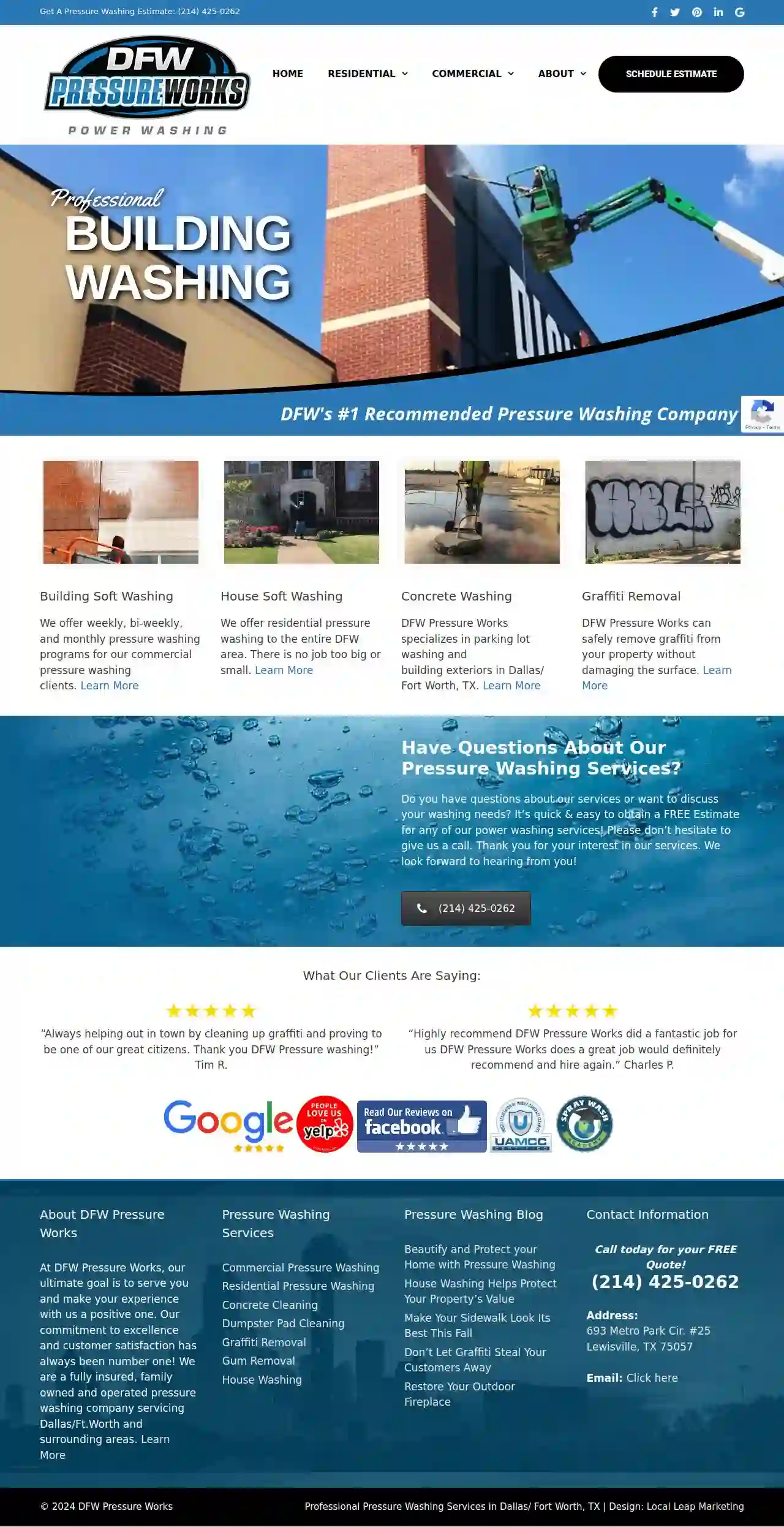Pressure Washing Montclair
Top 10 Power Washing in Montclair
Get 3 FREE Pressure Washing quotes for your project today! Compare profiles, reviews, accreditations, portfolio, etc... and choose the best deal.

Everclean Pressure Washing
526 reviewsJacksonville Beach, USEverclean Pressure Washing is a professional and experienced pressure washing company that takes great pride in providing high-quality cleaning services to our clients. We understand that each job is unique and requires a proper technique to achieve the best results. With our expertise, we know how to properly assess each job and determine the most effective way to clean the area without causing any damage. Whether it's a residential or commercial property, we know how to get the job done right. With our attention to detail and commitment to customer satisfaction, Everclean Pressure Washing is the go-to choice for anyone in need of professional pressure washing services.
- Services
- Why Us?
- Our Team
- Testimonials
- Gallery
Get Quote
Curb Appeal House Wash Pros
54 reviewsPortsmouth, VA, 9 Jester Ct, 23701, USCurb Appeal House Wash Pro's offers a true soft wash solution to homeowners and businesses including industrial and commercial buildings. Soft wash combined with the proper cleaning chemicals protects your investment while giving your home or business a presentable and sanitized cleaning. With our soft washing services we cover all of the Hampton Roads VA Areas. We are a Veteran-owned and operated local business, so we understand what it takes to get the job done right with care and attention to detail.
- Services
- Why Us?
- Gallery
Get Quote
Shore To Shore Power Washing
5142 reviewsKings Park, 64 Dogwood Rd, 11754, USShore to Shore Power Washing is a professional power washing company dedicated to helping keep your home or business clean. We offer a range of services including house washing, pressure washing, roof washing, deck cleaning and staining, exterior window cleaning, concrete cleaning and sealing, paver cleaning, sanding, and sealing, interior gutter cleaning, stain removal, efflorescence removal, solar panels cleaning, and fence washing. Our team uses state-of-the-art equipment and eco-friendly cleaning solutions to deliver exceptional results. With over 10 years of experience and 500+ happy customers, we are committed to providing top-notch service and ensuring customer satisfaction.
- Services
- Why Us?
- Testimonials
- Gallery
Get Quote
T.L.C. Home & Commercial Services LLC
54 reviewsRoanoke, VA, 123 Main St, 24017, USTLC Home & Commercial Services LLC is your one-stop shop for all home and commercial service needs in Roanoke, VA and surrounding areas. Our experienced team provides reliable, quality services to ensure you get the job done right at a fair price. From small repairs to full remodels, we have the experience and expertise to help you with any project or need.
- Services
- Why Us?
- Accreditations
- Our Team
- Testimonials
- Gallery
Get Quote
Star City Pro Wash
5104 reviewsRoanoke, USStar City Pro Wash is your one-stop shop for all your exterior cleaning needs in Roanoke, VA. We offer a wide range of services, including pressure washing, house washing, roof cleaning, window cleaning, gutter cleaning, and commercial washing. Our team of experienced professionals is dedicated to providing high-quality service and exceeding your expectations. We use the latest equipment and techniques to ensure that your property is cleaned safely and effectively. We are fully insured and licensed, so you can rest assured that your property is in good hands. We also offer competitive pricing and free estimates. Contact us today to schedule your free estimate!
- Services
- Why Us?
- Gallery
Get Quote
AGC Pressure Washing
Virginia Beach, USAGC Pressure Washing is a locally owned and operated business serving the Hampton Roads area of Virginia, including Virginia Beach. We offer a wide range of pressure washing services to meet the needs of both residential and commercial clients. Our team of experienced professionals is dedicated to providing high-quality service and exceeding customer expectations. We use eco-friendly products whenever possible and customize our services to fit each client's budget and needs. Whether you need your home or business exterior cleaned, we can help. Contact us today for a free estimate and see the difference AGC Pressure Washing can make!
- Services
- Why Us?
- Gallery
Get Quote
Omega Pressure Washing LLC
53 reviews1234 Main St, Suite 100, Virginia Beach, 23450, USOmega Pressure Washing provides pressure washing services for residential and commercial properties. Our services include low-pressure house washing, roof cleaning, driveway cleaning, deck cleaning, and more. We use the latest technology in our equipment and ensure that your property is cleaned safely and effectively.
- Services
- Why Us?
- Accreditations
- Our Team
- Testimonials
- Gallery
Get Quote
Kirk's Power Pressure Washing
5242 reviewsJacksonville, 32206, USKirk's Power Pressure Washing is a Jacksonville-based pressure washing company dedicated to providing professional, effective, and safe cleaning solutions for residential and commercial properties. We understand the importance of maintaining your property's appearance and value, which is why we utilize industry-leading equipment and supplies to deliver exceptional results. Our team of experienced professionals is committed to providing high-quality service with meticulous attention to detail. We offer a wide range of pressure washing services, including house washing, driveway washing, roof cleaning, dryer vent cleaning, sidewalk cleaning, fence washing, gutter cleaning, deck washing, paver sealing, rust removal, and commercial pressure washing. We also provide free estimates to ensure transparency and customer satisfaction. We proudly serve Jacksonville and surrounding towns, including St. Augustine, Ponte Vedra, Macclenny, Starke, and St. Marys.
- Services
- Why Us?
- Gallery
Get Quote
Pressure Works, Inc.
4.133 reviews123 Main St, Suite 100, Richmond, 23225, USPressure Works, Inc. is a one-stop shop for pressure washing, auto detailing, and cleaning supplies. They offer a comprehensive range of products and services including pressure washers, parts, accessories, and chemicals. With multiple locations, they provide repair and rental services as well.
- Services
- Why Us?
- Accreditations
- Our Team
- Testimonials
- Gallery
Get Quote
DFW Pressure Works
4.930 reviews693 Metro Park Cir #25, Lewisville, 75057, USAt DFW Pressure Works, our ultimate goal is to serve you and make your experience with us a positive one. Our commitment to excellence and customer satisfaction has always been number one! We are a fully insured, family owned and operated pressure washing company servicing Dallas/Ft.Worth and surrounding areas. We specialize in Commercial and Residential exterior cleaning. So call today and let us brighten up your investment!
- Services
- Why Us?
- Our Team
- Testimonials
- Gallery
Get Quote
Over 60,241+ Cleaning Companies on our directory
Our cleaning pros operate in Montclair & surrounding areas!
CleaningMatch has curated and vetted the Best Cleaning Contractors in and around Montclair. Find a top & trustworthy pro today.
Frequently Asked Questions About Pressure Washing
- Hard Surfaces: Pressure washing is often successful in removing graffiti from hard surfaces like brick, concrete, or metal.
- Delicate Surfaces: For delicate surfaces like wood or painted surfaces, a gentler approach using specialized graffiti removal products and techniques may be necessary.
- Professional Graffiti Removal: For stubborn or extensive graffiti, consider hiring a professional graffiti removal service. They have specialized equipment, cleaning solutions, and experience in dealing with various types of graffiti.
- Spring and Fall: Spring and fall are often ideal for pressure washing as the temperatures are moderate and the weather is typically dry.
- Summer: Pressure washing can be done in the summer, but avoid doing so during the hottest part of the day to prevent the cleaning solutions from drying too quickly and leaving streaks.
- Winter: Pressure washing is possible in the winter, but be mindful of freezing temperatures that can affect cleaning solutions and cause slippery surfaces.
- Online Reviews: Check online reviews on platforms like Google, Yelp, and Facebook to gauge customer satisfaction and service quality.
- Experience and Expertise: Look for companies with a proven track record and experience in pressure washing various surfaces.
- Licensing and Insurance: Ensure the company is licensed and insured to protect you from liability in case of accidents or damage.
- Equipment and Techniques: Inquire about the company's equipment and techniques to ensure they use appropriate pressure levels and cleaning solutions for different surfaces.
- Quotes and Pricing: Obtain detailed quotes from multiple pressure washing companies and compare their pricing. Make sure the quotes are transparent, outlining all services and costs.
- Professionalism and Communication: Choose a company that is responsive, provides clear communication, and demonstrates professionalism in its interactions.
- Driveways: Removes oil stains, tire marks, dirt, and grime, restoring the appearance of concrete, asphalt, or paver driveways.
- Decks and Patios: Cleans wood, composite, or concrete decks and patios, removing dirt, mildew, and algae, and preparing them for staining or sealing.
- Fences: Revitalizes wood, vinyl, or composite fences, removing dirt, grime, and weathering, and enhancing their appearance.
- Siding: Cleans vinyl, aluminum, brick, or wood siding, removing dirt, mold, mildew, and other contaminants, and restoring its original color.
- Roofs: Removes moss, algae, and other debris from roofs, extending their lifespan and improving their appearance. Soft washing is typically recommended for roof cleaning to prevent damage.
- Walkways and Sidewalks: Cleans concrete or brick walkways and sidewalks, removing dirt, grime, and stains, and improving safety by reducing slipperiness.
- Brick and Stone: Cleans brick and stone surfaces, removing dirt, mildew, and efflorescence, and restoring their natural beauty.
Can pressure washing remove graffiti?
If you're attempting DIY graffiti removal, always test the cleaning solution and pressure washing technique on an inconspicuous area first to avoid damaging the surface.
What is the best time of year for pressure washing?
Choose a day with mild temperatures and dry weather for optimal pressure washing results. Avoid pressure washing in extreme heat, freezing temperatures, or rainy conditions.
How do I find a good pressure washing service?
Utilize online directories like CleaningMatch to find and compare qualified pressure washing services in your area.
What surfaces can be pressure washed?
It's important to note that different surfaces require different pressure levels and cleaning solutions. Always consult with a professional pressure washing company to determine the appropriate cleaning method for your specific needs.
Can pressure washing remove graffiti?
- Hard Surfaces: Pressure washing is often successful in removing graffiti from hard surfaces like brick, concrete, or metal.
- Delicate Surfaces: For delicate surfaces like wood or painted surfaces, a gentler approach using specialized graffiti removal products and techniques may be necessary.
- Professional Graffiti Removal: For stubborn or extensive graffiti, consider hiring a professional graffiti removal service. They have specialized equipment, cleaning solutions, and experience in dealing with various types of graffiti.
If you're attempting DIY graffiti removal, always test the cleaning solution and pressure washing technique on an inconspicuous area first to avoid damaging the surface.
What is the best time of year for pressure washing?
- Spring and Fall: Spring and fall are often ideal for pressure washing as the temperatures are moderate and the weather is typically dry.
- Summer: Pressure washing can be done in the summer, but avoid doing so during the hottest part of the day to prevent the cleaning solutions from drying too quickly and leaving streaks.
- Winter: Pressure washing is possible in the winter, but be mindful of freezing temperatures that can affect cleaning solutions and cause slippery surfaces.
Choose a day with mild temperatures and dry weather for optimal pressure washing results. Avoid pressure washing in extreme heat, freezing temperatures, or rainy conditions.
How do I find a good pressure washing service?
- Online Reviews: Check online reviews on platforms like Google, Yelp, and Facebook to gauge customer satisfaction and service quality.
- Experience and Expertise: Look for companies with a proven track record and experience in pressure washing various surfaces.
- Licensing and Insurance: Ensure the company is licensed and insured to protect you from liability in case of accidents or damage.
- Equipment and Techniques: Inquire about the company's equipment and techniques to ensure they use appropriate pressure levels and cleaning solutions for different surfaces.
- Quotes and Pricing: Obtain detailed quotes from multiple pressure washing companies and compare their pricing. Make sure the quotes are transparent, outlining all services and costs.
- Professionalism and Communication: Choose a company that is responsive, provides clear communication, and demonstrates professionalism in its interactions.
Utilize online directories like CleaningMatch to find and compare qualified pressure washing services in your area.
What surfaces can be pressure washed?
- Driveways: Removes oil stains, tire marks, dirt, and grime, restoring the appearance of concrete, asphalt, or paver driveways.
- Decks and Patios: Cleans wood, composite, or concrete decks and patios, removing dirt, mildew, and algae, and preparing them for staining or sealing.
- Fences: Revitalizes wood, vinyl, or composite fences, removing dirt, grime, and weathering, and enhancing their appearance.
- Siding: Cleans vinyl, aluminum, brick, or wood siding, removing dirt, mold, mildew, and other contaminants, and restoring its original color.
- Roofs: Removes moss, algae, and other debris from roofs, extending their lifespan and improving their appearance. Soft washing is typically recommended for roof cleaning to prevent damage.
- Walkways and Sidewalks: Cleans concrete or brick walkways and sidewalks, removing dirt, grime, and stains, and improving safety by reducing slipperiness.
- Brick and Stone: Cleans brick and stone surfaces, removing dirt, mildew, and efflorescence, and restoring their natural beauty.
It's important to note that different surfaces require different pressure levels and cleaning solutions. Always consult with a professional pressure washing company to determine the appropriate cleaning method for your specific needs.